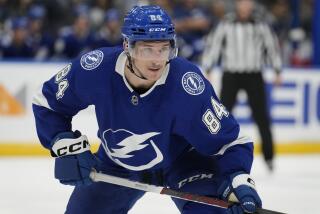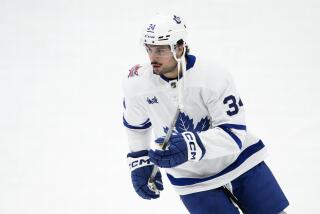THE NHL / HELENE ELLIOTT : Using Pro Players in the Olympics Will Hurt the Sport
In the 15 years since Herb Brooks coached a group of unheralded college kids to a stunning victory at the 1980 Lake Placid Olympics, no U.S. team has come remotely close to winning a gold medal.
Should it happen again, it won’t have the same impact--not if the NHL and the International Ice Hockey Federation carry out their announced plan to have NHL players participate in the 1998 Winter Games at Nagano, Japan. The league will profit from the format change, but American hockey might suffer.
Generally, U.S. Olympians have been college kids who sacrificed school or pro careers to give a year to the program. Under the new plan, American players will give only two weeks of their time; they won’t lose money because the NHL will go on hiatus. Players will be mercenaries for the NHL, which is eager for international TV exposure.
College players will have no chance to compete for Olympic berths against players such as Chris Chelios, Pat LaFontaine, Jeremy Roenick and John Vanbiesbrouck. Without the Olympics as an incentive, youngsters might be discouraged from starting the climb through peewee and youth programs. Even if they begin, their chances of eventually playing in the Olympics are small because the average NHL career is only about five years.
“I disagree with the thing entirely.” said Brooks, who has been out of the NHL since the New Jersey Devils let him go after the 1992-93 season.
“I think it kills the hopes and dreams of all our young American players, and it kills the hopes and dreams of young American coaches. I think USA Hockey (which oversees youth and Olympic programs) sold out for money. Our problem in the U.S. is we do not have a good developmental policy.”
USA Hockey runs developmental camps for players, but Brooks believes the one-week sessions are too brief. He advocates allowing states to create programs instead of sending kids to USA Hockey’s camps.
“What is the objective of USA Hockey? What are we trying to accomplish? We have a real poor underpinning,” he said. “States send in money, and there’s no return on their investment. What we need is a concise, intelligent developmental program for young people in this country. The idea is to do it on a state level so you can expand your reach. The broader the pyramid, the higher the peak.”
Brooks, who played in the 1964 and ’68 Olympics, said he has not met an Olympian who likes the NHL plan. The gold medal-winning 1960 team issued a formal statement of disapproval at a recent USA Hockey meeting in Tampa, Fla.
Brooks, incidentally, is recovering from burns he suffered when he tried to warm frozen pipes at his home outside St. Paul, Minn., and touched off a fire. After turning down a chance to coach the Minnesota Moose of the IHL, he remains involved with a company that markets street hockey sticks. He also delivers motivational speeches. The 1980 team had a reunion in Boston Sunday, two days after the 15th anniversary of its Lake Placid medal.
IT SOUNDED FUNNY, ANYWAY
To keep the Nordiques, government officials in the province of Quebec are leaning toward financing a new arena to replace the 15,399-seat Colisee. After years of complaining by owner Marcel Aubut failed to stir legislators, they jumped when the Comsat Corp., which owns the NBA’s Denver Nuggets, offered him $75 million for the team with the intention of moving it to Denver.
Their willingness was initially tied to Quebec City’s bid for the 2002 Winter Olympics and dependent on federal funds they’d get as the host city, but they’re looking at other options. If they don’t get the Games, they expect to finance the building through an on-site casino. Aubut has set a deadline for the end of May for the province to formulate a plan that’s worth his while.
Also in Quebec’s favor is the NHL’s reluctance to approve franchise shifts. Denver and Phoenix are prime expansion territory, and if an existing club moves there, the NHL gets nothing. If they land expansion clubs, the league will pocket entry fees of $60 million to $75 million per club.
TRADE WINDS STILL GUSTING
Dallas’ trade of Neal Broten to New Jersey for Corey Millen was made more for shock value than for the offensive spark General Manager Bob Gainey says it will generate.
Broten, a 1980 Olympian, was in his 15th season with the Stars, second to Boston’s Ray Bourque (17 seasons) in service with one club. Thomas Steen is now second with 14 seasons in Winnipeg, which surely deserves a medal.
The Stars, 1-8-2 in their last 11 games and 4-10-3 overall, are among the NHL’s biggest flops.
St. Louis center Craig Janney is still available, and the Red Wings are shopping winger Dino Ciccarelli, whose relationship with Coach Scotty Bowman has soured. A deal that would have sent Ciccarelli, defenseman Terry Carkner and another player to Florida for left wing Dave Lowry, right wing Bob Kudelski and defenseman Randy Moller fell through when the Panthers rejected Kudelski, the ex-King. However, they’ve continued their talks.
Also looking to deal: the Sharks, who are 2-8-2 since a 5-1 start, and the Whalers, who like Janney but not his $1.85 million salary.
DON’T PRINT THOSE TICKETS YET
To those who think the Pittsburgh Penguins’ fast start guarantees them a free ride to the Stanley Cup finals, we offer two words of caution: Ken Wregget.
Standing in for Tom Barrasso (injured wrist), Wregget has done a good job. But there’s no way Wregget, a career second-stringer with a 3.95 goals-against average over 11 seasons, will carry them. The Penguins are the NHL’s highest-scoring team, and he rarely has to play the close games he’ll see during the playoffs.
CAN THE FLAMES STAY AFIRE?
Calgary will finish the season without Gary Roberts, who learned Friday he needs surgery to remove damaged disks in his neck. The operation--similar to one Detroit’s Steve Yzerman had last year--will sideline him for six months.
No question, Calgary will miss Roberts, who had a team-high 41 goals last season. But the Flames, who on Sunday ended a trip in which they earned five of six possible points, are deep enough to withstand the loss. They’re also brawny, and they’re beginning to play more physically.
“This road trip, we’ve come to work and finished our checks,” defenseman Phil Housley said. “It was a successful trip, and we’re trying to get something going now.”
SLAP SHOTS
Yzerman scored four goals in his first five games but has none in his last 13. . . . With Minneapolis’ Target Center being sold to the city, officials there hope to attract an NHL team and might pursue the Winnipeg Jets to fill the vacuum left by the North Stars’ 1993 departure. If they can’t get an NHL team, they might try for an IHL team, which would provide a natural rival for the St. Paul-based Moose. . . . Benefit games during the lockout raised $1.5 million for charities and minor hockey groups, according to the NHL Players Assn.
The Sharks are 0 for 32 on the power play over their last seven games. . . . The Flyers’ acquisition of John LeClair has helped their power play convert eight of 22 attempts over their last five games. . . . Radek Bonk, who got a five-year, $6.125-million contract, has only three points for Ottawa in 16 games and is a minus-three defensively. . . . Bruin right wing Cam Neely, limited by knee problems to 49 games last season, has missed only one game this season. . . . Kent Nilsson is back in the NHL with Edmonton. Mats Naslund signed with Boston. Isn’t it about time for Gordie Howe to make another comeback?
More to Read
Go beyond the scoreboard
Get the latest on L.A.'s teams in the daily Sports Report newsletter.
You may occasionally receive promotional content from the Los Angeles Times.







